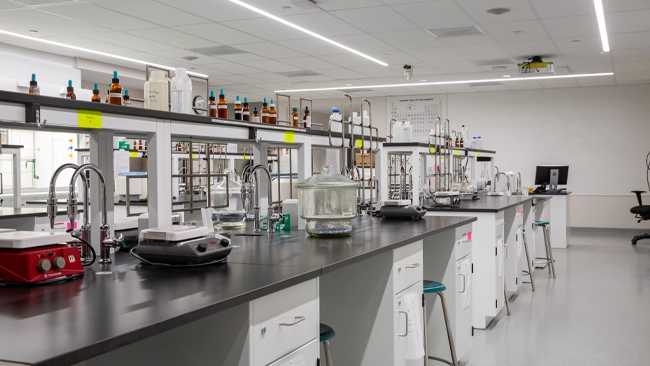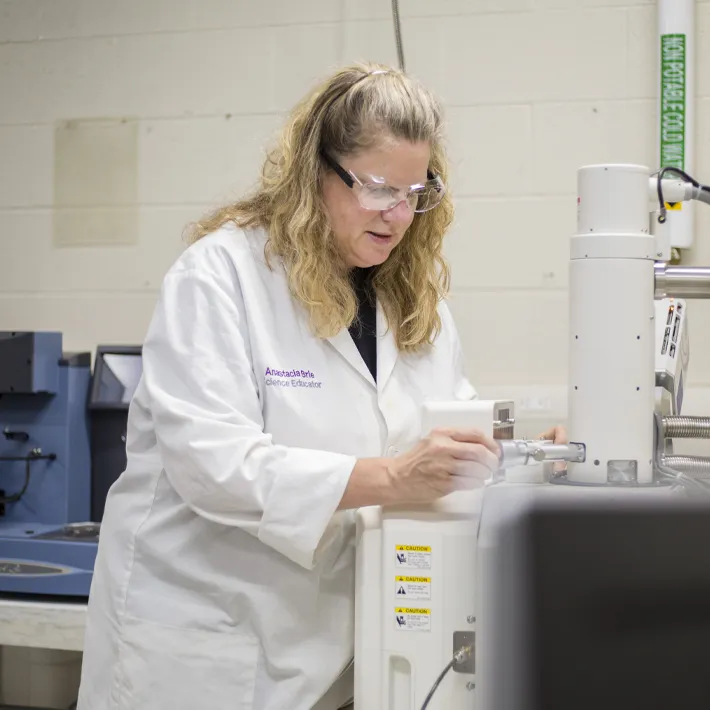

Workplace Safety & Prevention
Overview
Occupational Health & Safety professionals work in every business and every industry creating safe work environments.
Many industries, ranging from construction and manufacturing to energy and health care are seeking specially trained workers to promote and enforce health and safety legislation and to ensure safe and healthy work environments.
Students can expect to become competent in understanding and applying health and safety skills like risk management, accident prevention and investigation, safety audits, work refusals, and safety management systems and much more.
Program curriculum guides students through scenario-based learning as well as fosters safety communication skills that are necessary in workplaces today.
Graduates will be comfortable entering the workforce and working to enhance strong safety cultures of companies and organizations across both public and private companies.
A Collaborative Approach

This program is delivered in partnership with Seneca and Cambrian Colleges. Students are taught by faculty from all three colleges and study alongside students from Cambrian, Seneca, and Lambton Colleges.
Core curriculum is shared by all three institutions which means a significant number of core courses will be delivered remotely through online platforms. Students are expected to have a device that is compatible with virtual classroom software and are expected to engage in live lectures.
Admission Requirements
O.S.S.D. or equivalent with:
- Grade 12 English C or U
- Grade 11 or 12 Biology C or U
-or-
Grade 11 or 12 Chemistry C or U
(both recommended, only one required)
Mature Student Assessment for this program is available in the subject of English for the purpose of demonstrating proficiency in this required admission subject. For all other admission requirements, applicants must complete the required course(s) as listed above. For more information, please contact counselling@lambtoncollege.ca. Review the Mature Student Admission process.
Academic admission requirements can be obtained through Academic Upgrading and the Pre-Technology & Trades (PTEC) program at Lambton College.
of surveyed Occupations Health & Safety professionals had high levels of satisfaction with their careers. ~according to Board of Canadian Registered Safety Professionals
Professional Accreditation
Graduates of this program meet the requirements set out by the Board of Canadian Registered Safety Professionals (BCRSP) and are qualified to write the Canadian Registered Safety Technician (CRST) examination to earn the CRST designations.
Upon completion of additional relevant occupational health and safety experience, graduates are able to apply for the Board of Canadian Registered Safety Professionals (CRSP) certification.

Costs
- Year 1 $4,676.91
- Year 2 $4,586.88
Please Note: These fees apply to the 2025-2026 academic year and are subject to change. Fees do not include books (unless specifically noted), supplies or living costs.
Additional Fees
-
Lab Coat$40.00
-
Safety Shoes$150.00
-
Safety Glasses$10.00
Scholarships Available
There are 9 scholarships available for this program, with a total value of $1,700!
Technology Requirements
In order to keep pace with the requirements of each and every course in your program, Lambton College requires that each student have access to a laptop while studying at our college.
Labs & Equipment
Courses
Occupational Health & Safety
This introductory course provides students with a foundational understanding of the diverse and evolving field of Occupational Health and Safety (OHS), with a focus on the Ontario context. Students will explore the key technical, legal, political, and personal factors that influence workplace health and safety. Core topics include the Occupational Health and Safety Act, Workplace Safety and Insurance Board (WSIB) processes, WHMIS, Transportation of Dangerous Goods, accident prevention and investigation, physical and biological hazards, and the principles of managing OHS programs. This course equips students with the essential knowledge and skills needed to support safe work environments and prepare for further study or entry-level roles in the field.
Critical Thinking & Writing
This writing course challenges students to explore diverse opinions and articulate their own perspectives clearly and persuasively. Through critical reading, students will develop skills in synthesis, analysis, comparison, and response, striving for clarity and diplomatic expression of their opinions based on factual evidence. Students will practice various rhetorical strategies of persuasion and hone their writing to ensure precision and accuracy in their messages. This course lays the foundation for a subsequent research-writing course, equipping students with essential skills for academic success.
Workplace Communications Applications & Analysis
In today's management and administration workplace, having strong computer skills is essential. This course provides students with resources and guidance to develop skills in Microsoft Office applications, focusing on three key areas: Word, Excel, and PowerPoint. While learning about these programs, students develop skills in time management, accountability, and their ability to follow direction.
Basic Chemistry I
This course is intended to provide the student with an introduction to basic chemical principles and skills. Topics include classification of matter, physical and chemical changes, chemical nomenclature, writing balanced chemical equations, and gas laws. Students perform calculations of quantities of substances consumed and produced in chemical reactions in terms of mass, moles, and gas volumes. Laboratory exercises complement theoretical concepts and develop good, safe laboratory practices through hands on activities and chemical experimentation. This course prepares students for CHM 2004, Basic Chemistry II, in which concepts relating to organic chemistry and aqueous solutions are developed.
Program Design, Development & Implementation
Students will learn to design, implement, manage and evaluate new and existing programs in the workplace. Students will learn how to review legislative requirements, processes, tools and equipment, collect and analyze data to design effective and functional programs to meet organizational needs. Students will learn methods to evaluate programs and present findings to assist in making informed decisions.
General Education Elective
Job Search & Success
This course provides student with skills and knowledge to help support their career search and succeed in the workplace. Students align their personal skill set and goals to guide them on their career paths. They will learn how to effectively conduct a job search, build a professional and well-tailored resume and cover letter, and develop and practice interview techniques. Students will also develop their personal brand to help support effective career networking and aid in their job search. Teamwork and collaboration in the workplace are also discussed. Self-reflection is used to inspire insight and support their professional career journey.
OHS Management Systems
Students are introduced to the basic concepts of health and safety management. It will introduce individual elements of the Occupational Health and Safety Management systems. Students will set health and safety priorities, develop management system plans, and negotiate health and safety requirements. This course follows the management system standards commonly applied in Canada.
Health & Wellness
In this course, students will explore health and wellness promotion and prevention as integral components of Occupational Health and Safety. The relationship between work and the determinants of health will be presented and students will examine workplace trends and observations as key drivers in the development of Workplace Wellness Programs. Students will participate in identifying risk factors and hazards influencing the health, safety and the well-being of individuals and organizations. As well students will conduct workplace health surveys and will design, promote, implement and evaluate wellness initiatives based on health promotion theory using a holistic and multidisciplinary approach in accordance with organizational policies.
Introducton to Biology
This course is designed to introduce the student to basic human anatomy and physiology through the study of organ systems including the following: nervous, circulatory, respiratory, digestive and urinary. General organization of the body, cells, tissues, and organs will also be considered.
Human Interaction
HIN 3303 offers the learner a practical lesson in working with others in all of life's situations, including family, friends, school and the workplace. It is imperative that we have acceptable and effective interaction skills. Students will study and exercise various workplace practices to ensure that they can be valuable contributors to their workplace environment. Teamwork and many other group dynamics will be studied and practiced.
Ethical Leadership & Critical Decision Making
This course challenges students to critically examine the ethical dimensions of business decision-making in local and global contexts. Students will explore traditional foundations of business ethics-including ethical theories, corporate social responsibility, and organizational culture-while also engaging with emerging areas such as technology ethics, sustainability, diversity and inclusion, and stakeholder activism. Through case studies, debates, and applied projects, students will develop skills in ethical analysis, stakeholder evaluation, and responsible leadership. The course equips students with the tools to navigate complex dilemmas and to foster ethical practices in their professional and community roles.
General Education Elective
Co-op Work Term
Co-operative education provides students with the opportunity to apply classroom learning to the workplace, undertake career sampling and gain valuable work experience that may assist students in leveraging employment after graduation.
Risk Management
Students are introduced to the techniques and basic concepts of hazard management, recognition, evaluation, and control of health and safety hazards in the workplace. Risk management is an essential component of a properly functioning occupational health and safety program. Risk management principles, concepts and models. Explore critical considerations, including risk perception and tolerance as well as risk management strategies. Risk management principles, models and theories, risk management foundations; organizational risk management; risk assessment; conducting a risk survey; analyzing risk and setting priorities for action; incorporating risk management in organizational systems, policies and processes; and evaluating the success of risk mitigation strategies. Following this course, learners will be able to assess an organizations risk management program to determine if it is meeting organizational objectives and recommend strategies and techniques to plan, organize, and control activities in a way that minimizes risk and the effects of risk on the organization.
Accident Prevention & Investigation
The history of accident prevention will be examined, and will concentrate on the principles of managing safety. This course examines proper accident investigation, accident reporting, audits, inspections, accident costs, safety committees, elimination of hazards and basic loss control principles. This course examines the techniques and procedures for the prevention, control, and investigation of workplace accidents, incidents and hazards (with an emphasis on the Province of Ontario).
Disability Management
Exploration of key concepts leading to practices in integrated Disability Management will be learned by students. A multi-disciplinary approach to managing all forms of disability will be put forward based on sound best practice disability management techniques. The Workplace Safety and Insurance Act and how the compensation system operates, along with government legislation, Workplace Safety and Insurance Board (WSIB), Accessibility for Ontarians Disability Act and applicable regulations will be reviewed. Multiple models of disability management will be presented. The assessment, evaluation, and accommodation of various return to work processes will be undertaken, developed and implemented.
Ergonomics
In this course, students will explore fundamental principles of occupational ergonomics. Students are introduced to the practice of ergonomics and the technical elements required when developing an ergonomics program to prevent occupational illness and injury by changing the design of work and workplaces. Building on a foundation of anatomy, physiology, biomechanics and information processing, the students will study how to evaluate and apply human capabilities and limitations to the design of workplaces, work methods, and jobs positions for optimal safety, efficiency, productivity and comfort.
The Legal Aspects of HR
This scenario/case-based course will provide students with insight into the legal aspects of human resources management through the entire employment relationship. The focus of this course will be on current federal and provincial employment-related legislation. Students will become familiar with specific areas of law and will apply learned concepts and terminology to address issues related to effective human resource management. Students will be introduced to content specific to workplace complaints and workplace investigations as this is an expanding area of responsibility for human resource professionals.
General Education Elective
Operational Safety
In this course, students will explore basic theoretical and operational knowledge of the hazards and techniques that may be encountered in the workplace. Students will identify hazards and safe operating procedures that include: Safeguard Systems, Personal Protective Equipment, Hazardous Energy, Materials Handling and Storage, Hoisting and Rigging Equipment, Powered Industrial Vehicles, Hand and Portable Power Tools, Woodworking Machinery, Welding and Cutting, Metalworking Machinery, Automated Systems or Processes, Confined Spaces, and Fall Protection.
Organizational Behaviour
This subject is an examination of the contemporary Canadian business environment including the organization, leadership and management decision process which influences the behaviour of individuals and groups. Increased global competition, technological change and the rising expectations of both employees and employers have underlined the need for improved and more effective leadership. This subject provides a better understanding of this process.
Industrial Hygiene and Toxicology
Students will be introduced to the role of the occupational (industrial) hygienist and learn the basic concepts of anticipation, recognition, evaluation, and control of health hazards in the workplace environment. Topics will examine chemical, biological, physical and ergonomic stressors, assessing their routes of exposure and potential health effects on workers. Exposure monitoring for chemical, biological, and physical hazards frequently encountered in the workplace is reinforced through laboratory experiments and field measurements. As a hands-on component to theory of industrial hygiene and toxicology, students employ practical methods of sampling, measurement techniques and interpretation of results.
Emergency Planning & Management
Students will develop an understanding of various emergency plans/procedures, identifying roles and responsibilities in emergency plans. This course is specific to the Emergency Response field with a strong focus on fire prevention. Students will learn unique information concerning response to emergencies, how to manage them, drill preparation and preparedness.
Introduction to Process Safety
In this course, students will investigate the prevention of unintentional releases of chemicals, energy, or other potentially dangerous materials during the course of chemical processes that can have a serious effect to the workplace and environment. Students will study how industrial processes can affect worker and environmental health and safety.
Environmental Management
This course provides a comprehensive overview of environmental management principles, practices, and policies with a focus on sustainable development and resource stewardship. Students will explore the complex interactions between human activities and natural systems, and learn how to design, implement, and evaluate strategies to mitigate environmental impacts. Key topics include regulatory frameworks, pollution prevention, waste management, natural resource management, air pollution control technologies, water and wastewater management and corporate sustainability. The course also examines global environmental challenges such as climate change, biodiversity loss, and water scarcity. Through lectures, discussions, group projects, and practical assignments, students will develop critical thinking and problem-solving skills necessary for addressing environmental issues in a variety of professional contexts.
Contact
Applied Science, Engineering Technology & Trades
Program Information
After Graduation
Employment Opportunities

Graduates will be able to conduct risk assessments and hygiene tests to prevent hazards and harm to workers, property, the environment, and the general public. These graduates may find employment in a variety of industry sectors such as, safety inspection, auditing, risk management, emergency management, environmental management, and human resources management roles.
Pathways
Build on your education and complete a college diploma or university degree in Ontario, Canada, or abroad
Want to see more Ontario transfers? Visit ONTransfer.ca.
Co-op
About Co-op
Students in this program have the opportunity to gain valuable work experience by applying classroom learning during co-op experiences.
Learn more about co-op terms and the roles and responsibilities of students and co-op advisors.
More Information
Empowering Women to Lead in Tech & Trades
Our Women in Technology & Trades (WiTT) is a vibrant community dedicated to empowering women to thrive in tech and trades. Through mentorship, industry connections, and skill-building programs, WiTT breaks down barriers and fosters an inclusive environment where women can confidently pursue their passions and careers.
Together, we’re shaping a diverse and dynamic future.
Learn more about WiTT
Technology Requirements
It is recommended that you use a Windows laptop for your coursework. While other devices like MacBooks or Chromebooks might work for some tasks, they may not support all the software required for your program. If you're unsure, check with your professors before buying.
Internet Speed Requirements
To get the best experience while learning online, we recommend having an internet connection with at least 40 Mbps download speed and 10 Mbps upload speed. This will help you use video calls, attend online lectures, and access other learning tools smoothly.
Because students live in many different areas, we can't suggest a specific internet provider. You'll need to check with local companies to find one that works best for you.
Laptop Requirements
In order to access the internet and virtually-delivered software and courseware, student laptops should include the following at a minimum. By meeting the following specifications, students will be equipped to access software and courseware on their laptop through the internet:
- Intel i5 8th Gen Processor or equivalent
- 8GB of RAM
- 100 GB HDD or more
- Webcam with a microphone
- Wi-Fi capable (802.11n/ac 5GHz)
- Windows 11 operating system
Mobile Device
Students will require a mobile device (smartphone) for:
- Accessing your digital student ID
- Using campus applications and services
Software
To ensure students are getting the most our of their classroom experience, some software will be required.
Lambton College has made this software easily accessible online. Students can leverage our Microsoft Office 365 software packages and services. In addition, much of the software you require for your courses will be available on demand for use on any device - on or off campus.

